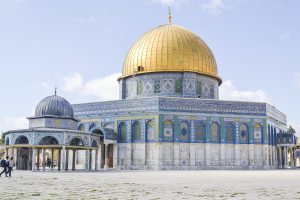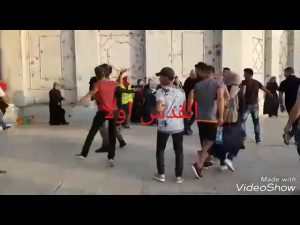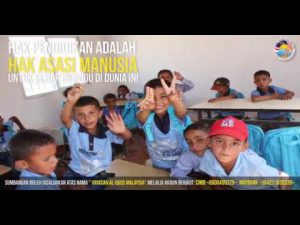By: Majd Al-Hadmi
Translated and modified by QFM
With the early appearance of the radio in our countries as a popular instrument, the radio stations have sought to bring the reciters of the Holy Quran to recite in specific times across the air.
This was clearly demonstrated during the period of the British occupation and the Jordanian rule, and this practice has remained to this day. The period between the 1940s and 90s witnessed frequent visits of famous reciters from the Islamic world, especially from Egypt, whose readers are distinguished by their method of investigating recitation according to the rules of Tajweed which is based on the long breathing and toning between the vocal sounds.
This method is a pictorial reading of the Quranic text by the voice of the reciter, so it has been more popular and more accepted than other methods by the people of al-Quds.
In 1942, Sheikh Abu Al-Enein visited al-Aqsa Mosque after he received an invitation from the British Near East Radio, which was based in Jaffa. He read several recitations during the month of Ramadan. he was the first Egyptian reciter to recite Quran in al-Aqsa Mosque in our modern era.
In 1957, Sheikh Mohammed Siddiq Al-Menshawi visited al-Aqsa Mosque and impressed the worshipers with his voice, which they received directly after they heard it through the radio station.
He read different parts of surat Al-Isra, Mariam, Al-Fajr, and Al-Balad and they were the most beautiful recitations that he read in al-Aqsa. According to what we found in this short research, Al-Menshawi visited al-Aqsa Mosque four times, in 1957, 1961, 1962, 1964.
The broadcasters were following Sheikh Mohammed Siddiq Al-Menshawi to record his recitations because of the scarcity of his voice and the tranquillity that he conveys to his audiences.
He has several remarkable situations, he refused to join the delegation of the Egyptian reciters who visited al-Quds in 1968 after it fell down under the Israeli occupation. Sheikh Al-Manshawi died in 1969.
In addition, Sheikh Abdul Basit Abdul Samad who is remarkable by his golden larynx visited al-Aqsa Mosque in 1964. He read several famous recitations from surat Al-Isra, Alanbia’a, Al-Ahzab, Al-Naml and all the short surats.
Sheikh Muhammad Salah al-Din Kabara – Sheikh of the reciters of Tripoli- also recited in al-Aqsa Mosque in 1947, and had wonderful recitations at al-Aqsa Mosque during his stay in al-Quds for a year.
He also recorded some recitations for Al-Quds Radio during his period of residence before the occupation of Palestine, and visited al-Quds again in 1964 to recite during the holy month of Ramadan.
The general Sheikh of the Egyptian reciters Sheikh Mahmoud Khalil Al-Husari also visited al-Aqsa Mosque in 1968, and read several different recitations.
Sheikh Muhammad Salah al-Din Kabara and Sheikh Mahmoud Khalil Al-Husari
The famous Sheikh Mustafa Ismail also recited in al-Aqsa Mosque during his several visits in the fifties and sixties of the last century. Most recently when he was accompanied by the Egyptian President Mohamed Anwar Al-Sadat in 1977 during his visit to al-Quds before signing the Camp David agreement.
Sheikh Mustafa Ismail recited in al-Aqsa Mosque during the Eid prayer before Al-Sadat’s speech in the Zionist Knesset.
Sheikh Mustafa Ismail at al-Aqsa Mosque
In spite of the popular rejection of Al-Sadat’s visit to al-Quds, and although the people of al-Quds received Al-Sadat by the controversies, in addition to condemning the closure of al-Aqsa Mosque after preventing the people to enter al-Aqsa for the Eid prayer because of Al-Sadat’s visit, but the perception towards the reciters was separate and different, the people were admired be their performance and welcomed them by warm reception.
This perception is not limited to those who accompanied Al-Sadat, but also includes multiple visits of a number of reciters who visited al-Quds after the 1978 Egyptian-Israeli peace agreement (Camp David).
Reciters from outside Palestine were also invited to participate in the national and social events. It is worth mentioning here the invitation of the Palestinian Red Crescent Society in al-Quds to Sheikh Mustafa Ismail to attend its monthly social medical symposium, convened by the society, which was then headed by Dr. Salim Maatouq.
Moreover, Sheikh Mohammed Ali Al-Banna, Mahmoud Siddiq Al-Menshawi, Mahmoud Tablawi, Mohammad Al-Tukhi, Mohammed Al-Abd, and other reciters of the Islamic world read and recited the holy Quran in al-Aqsa Mosque.
The most prominent reciters of the local radio, (from Palestine) is the reciter Sheikh Abdullah Yusuf, who used to recite at al-Aqsa Mosque in the official recitations, Friday prayers and Eid prayers as a reciter of al-Aqsa Mosque. He was distinguished by his beautiful voice, his elegant dress with his formal suit, and his kuffiyeh which is always covered his head.
The voice of Sheikh Abdullah Yusuf remained in the memory of the people of al-Quds, remembered by the generations who heard him on the Jordanian television which continued to broadcast his recitations after his death (1988-1989). He has several different recordings of the Holy Quran and prayers.
The reader of the Ibrahimi Mosque, Sheikh Mohammad Rashad Al-Sharif also visited Al-Aqsa Mosque. He was also reciting in al-Quds Radio in the 1940s. Sheikh Al-Sharif was hired in 1966 as a reciter of al-Aqsa Mosque, the only reciter of al-Aqsa who recorded the whole Quran. He visited al-Aqsa Mosque three years ago, and it was his last visit before his death in Amman last year.
Sheikh Mohammad Rashad Al-Sharif recites Quran at al-Aqsa Mosque
Among the reciters who received the honor of reciting the holy Quran in al-Aqsa Mosque; Sheikh Dawood Attallah, Yasser Qulibu, Mohammed Al-Ghazzawi, Atta Shaher Rashid and Naji Al-Qazzaz.
After the Palestinian Authority took over the administration of the West Bank and Gaza, official invitations were sent to the Egyptian Ministry of Awqaf to send Egyptian reciters to read at the al-Aqsa Mosque during the month of Ramadan. This tradition remained until 2002.


